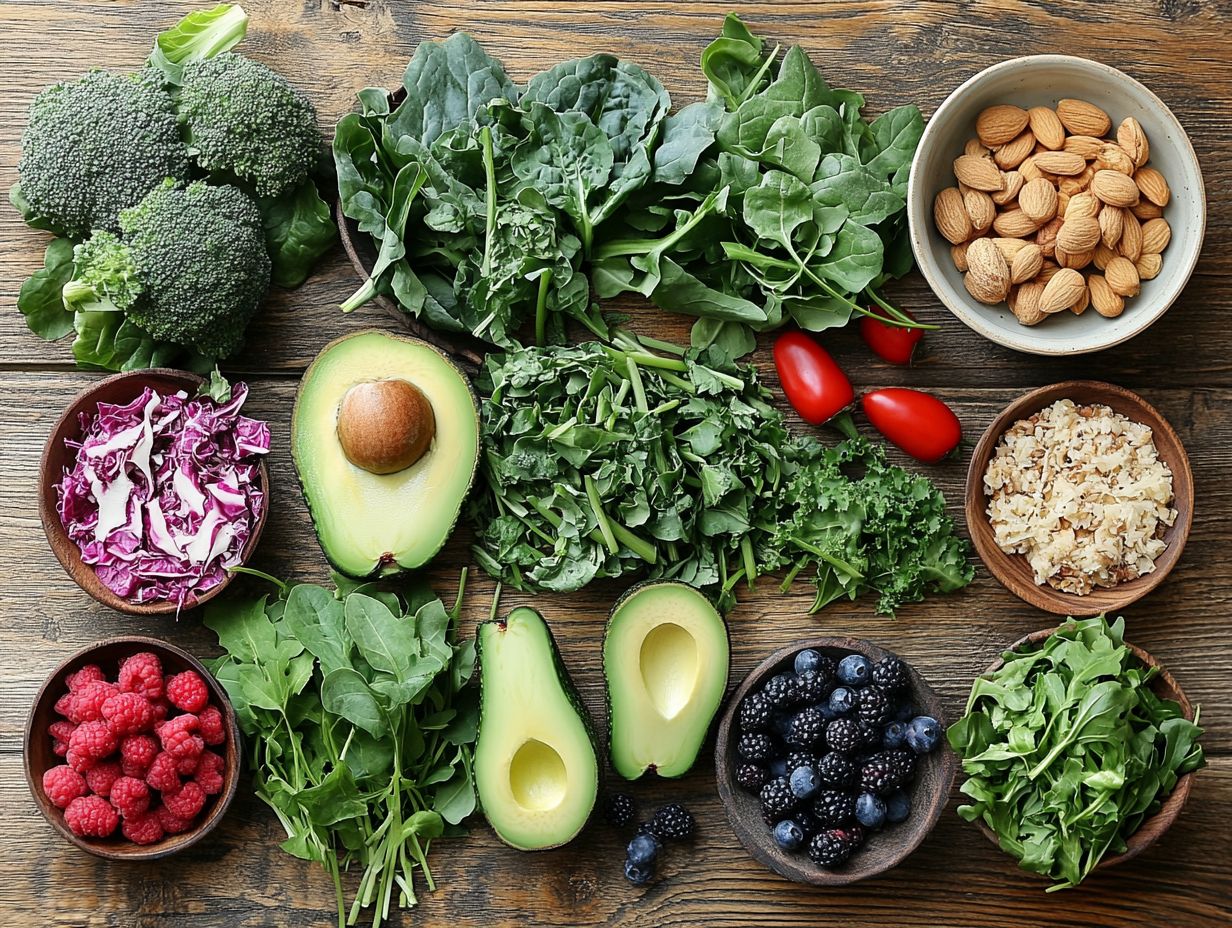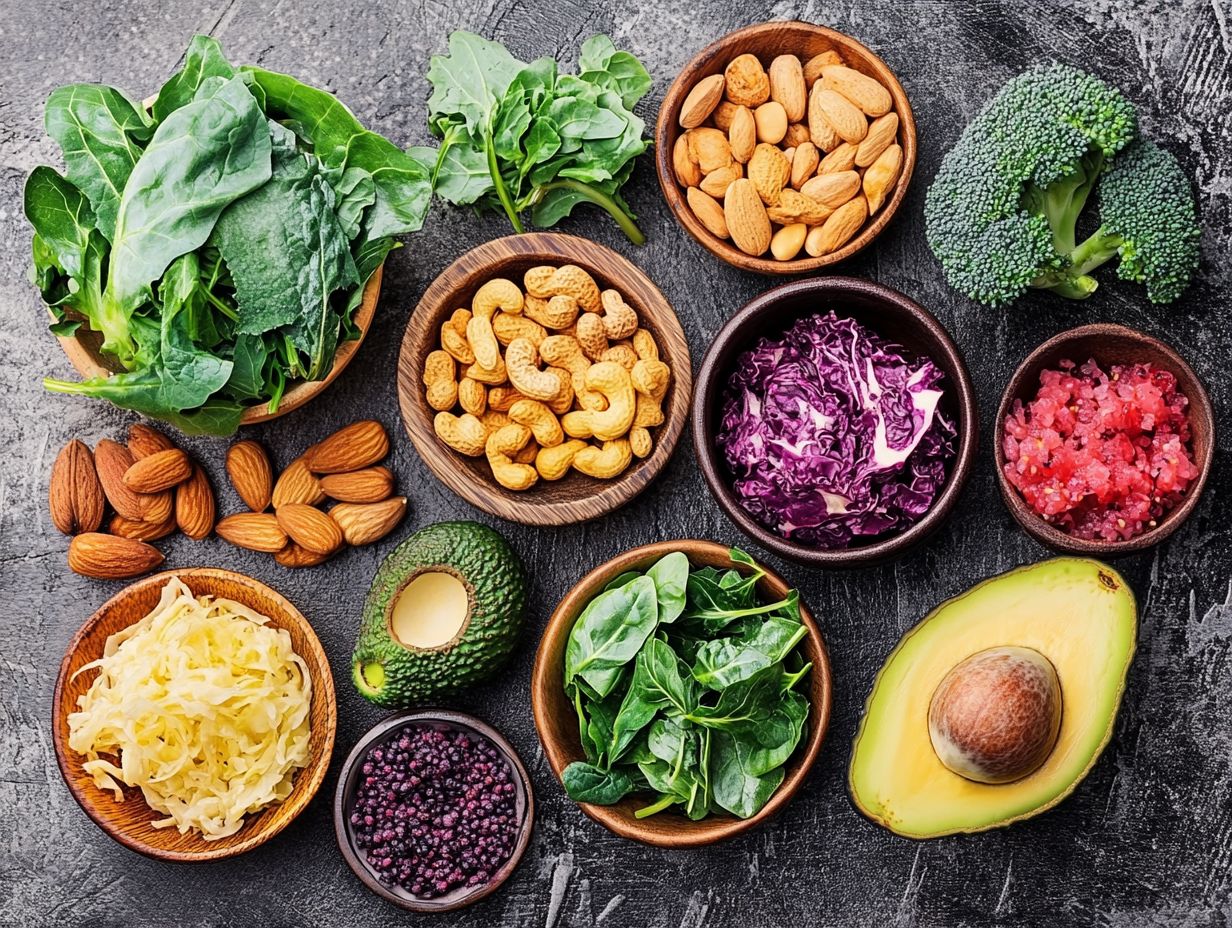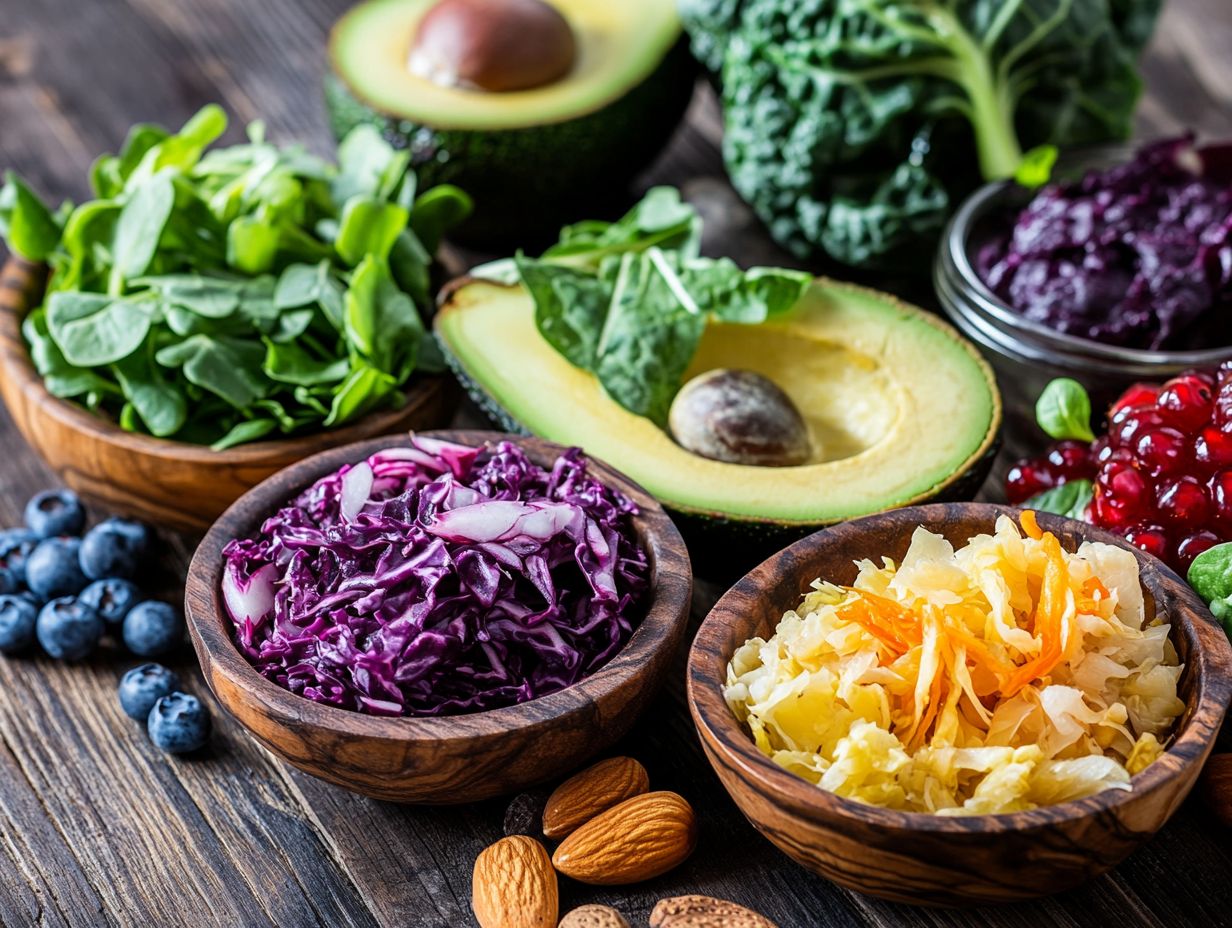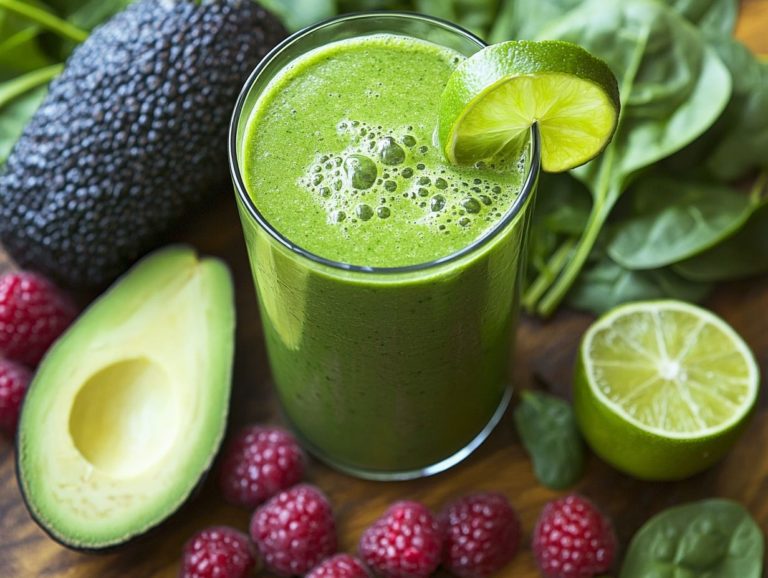Keto-Friendly Foods for a Healthy Gut
The Keto diet has surged in popularity, celebrated for its potential to facilitate weight loss and improve overall health. But how does this low-carb, high-fat approach influence your gut health and nutrient absorption, particularly the gut microbiome?
This article delves into the benefits and risks associated with the Keto diet, examining the complexities of the gut microbiome and highlighting how specific Keto-friendly foods can promote a healthy digestive system. It also pinpoints which foods to avoid, such as high-fat meats and artificial sweeteners, in order to maintain optimal gut health while adhering to Keto. We will explore dietary patterns and food variety within a low-carbohydrate, high-fat diet.
Discover with us the fascinating link between your diet and gut wellness!
Contents
- Key Takeaways:
- What is the Keto Diet?
- What Are the Risks of a Keto Diet?
- How Does the Keto Diet Affect Gut Health?
- What Are the Best Keto-Friendly Foods for a Healthy Gut?
- 2. Non-Starchy Vegetables
- 3. Healthy Fats
- 4. Bone Broth
- Boost Your Gut Health on a Keto Diet
- What Are the Worst Foods for Gut Health on a Keto Diet?
- Frequently Asked Questions: Understanding the Ketogenic Diet
- What is the keto diet and how does it affect gut health and dietary inflammation?
- What are some keto-friendly foods that are good for gut health and provide beneficial antioxidants?
- Can I still eat dairy on a keto diet for a healthy gut and optimal nutrient absorption?
- What are some keto-friendly snacks that support gut health and provide essential micronutrients?
- Are there any foods I should avoid for a healthy gut on a keto diet to prevent adverse digestive effects?
- Can I follow a keto diet for a healthy gut and weight maintenance long-term?
Key Takeaways:

- The keto diet has been shown to have benefits for gut health, such as reducing inflammation and improving digestion.
- Including fermented foods, non-starchy vegetables, and healthy fats in a keto diet can promote a healthy gut microbiome by enhancing the diversity of gut bacteria.
- Processed foods, artificial sweeteners, and high-fat meats should be avoided on a keto diet to maintain a healthy gut.
What is the Keto Diet?
The keto diet, or ketogenic diet, is a low-carbohydrate, high-fat nutritional strategy. It aims to shift your body’s metabolic state into ketosis, a state where the body burns fat for energy instead of carbohydrates. This diet emphasizes healthy foods, including omega-3 rich sources like salmon and other seafood.
This dietary approach not only promotes rapid weight loss but also unveils a host of health benefits, such as elevated energy levels, enhanced mental clarity, and improved management of specific health conditions like type 2 diabetes, heart disease, and obesity.
By focusing on wholesome foods packed with essential nutrients and limiting carbohydrate intake, you can explore a diverse range of food options that support your weight maintenance and overall well-being.
What Are the Benefits of a Keto Diet?
The benefits of the keto diet go far beyond mere weight loss. They encompass a myriad of health advantages that can significantly enhance various aspects of your well-being. This dietary approach is associated with improved metabolic states, reduced dietary inflammation, better gut health, and increased fiber intake through the inclusion of non-starchy vegetables and healthy fats.
By embracing foods like avocados, nuts, seeds, eggs, and seafood in your meal plans, you can optimize your nutritional intake while reaping the health rewards of a ketogenic lifestyle. Including chocolate in moderation can also contribute to antioxidant intake.
The keto diet is particularly effective in stabilizing blood sugar levels, making it an appealing choice for anyone looking to manage diabetes or prevent those pesky insulin spikes. Shifting towards a high-fat, low-carb regimen enables your body to efficiently burn fat for energy, boosting your stamina and enhancing mental clarity.
Essential nutrients found in foods such as olive oil, leafy greens, berries, and high-fat dairy support overall vitality and promote nutrient absorption. This fosters a healthier lifestyle that prioritizes not just weight management but also long-term wellness.
To learn more about the Keto diet and explore Keto-friendly foods, take the first step towards integrating these health benefits into your daily meals.
What Are the Risks of a Keto Diet?
While the keto diet presents a plethora of benefits, it’s crucial to understand that it also comes with its own set of risks, especially when considering long-term adherence and potential health impacts for certain individuals.
You may find that drastic reductions in carbohydrate intake can lead to digestive issues, such as constipation or deficiencies in essential micronutrients and dietary fiber.
Moreover, your body adjusting to a new way of eating can present challenges, particularly if you have existing health conditions. Consulting dietary advice and reviewing research studies, such as those conducted by organizations like ZOE, can help you fully grasp the implications of the keto diet.
As you transition to a low-carbohydrate lifestyle, it’s vital to pay attention to how these changes might affect your gut health and nutrient absorption. This makes it vital to create a well-rounded dietary plan without delay to ensure you’re getting enough fiber and essential vitamins.
If you have pre-existing conditions like diabetes or heart disease, you should be especially cautious, as your response to the keto diet might differ significantly from others. Working with a healthcare professional or a registered dietitian can equip you with personalized strategies to navigate these concerns, ensuring a balanced approach that maximizes benefits while minimizing risks.
With the right guidance, you increase your chances of achieving sustainable and healthy outcomes.
How Does the Keto Diet Affect Gut Health?
The connection between the keto diet and gut health is intricate and layered, as this low-carbohydrate, high-fat dietary approach profoundly influences the gut microbiome, a cornerstone of overall digestive wellness. Intermittent fasting practices can complement this diet by offering unique fasting benefits for gut health.
Evidence suggests that following the keto diet can change the composition of gut bacteria, which may impact digestion, nutrient absorption, and immune function.
By thoughtfully incorporating nutritious foods like non-starchy vegetables and probiotic-rich options you can nurture a balanced gut microbiome while fully enjoying the advantages of the ketogenic lifestyle.
What Is the Gut Microbiome?
The gut microbiome is an intricate ecosystem composed of trillions of microorganisms residing in your digestive tract, and it plays a pivotal role in your overall health. By aiding digestion, regulating your immune system, and influencing metabolic functions, this diverse community of bacteria, viruses, and fungi underscores the importance of a well-balanced diet rich in prebiotics and probiotics.
Prebiotics are types of fiber that feed good bacteria in your gut, while probiotics are live bacteria that help maintain gut health. An optimal gut microbiome not only enhances nutrient absorption but may also lower your risk of various health conditions, including type 2 diabetes and heart disease.
This sophisticated network of microbes performs essential functions, including synthesizing vital vitamins, breaking down indigestible carbohydrates, and training your immune system to differentiate between harmful invaders and beneficial entities. The composition and functionality of your gut microbiome are significantly shaped by your dietary choices; fiber-rich foods encourage microbial diversity and stability.
Incorporating probiotic-rich options, such as yogurt and fermented products, can further elevate your gut health by introducing beneficial bacteria.
Therefore, making informed dietary decisions is crucial for nurturing a resilient microbiome, which in turn plays an essential role in maintaining your optimal health and well-being. Personalized nutrition advice can enhance this process by tailoring dietary patterns to individual needs.
Consulting with a healthcare professional or conducting further research on the keto diet can provide valuable insights for your journey.
Impact of the Keto Diet on the Gut Microbiome

The keto diet can profoundly influence your gut microbiome, thanks to the types of nutrients in the food. It typically results in a lower fiber intake compared to more traditional diets.
This reduction in dietary fiber can shift the diversity and composition of your gut bacteria, potentially leading to both beneficial and detrimental effects on your gut health. Understanding these potential digestive effects is crucial for maintaining a balanced gut microbiome.
By thoughtfully incorporating fiber-rich, non-starchy vegetables and probiotic foods into your meal plans, you can support a thriving gut microbiome while embracing a ketogenic lifestyle.
Understanding the significance of gut health for your overall well-being is crucial. Your digestive system flourishes on a diverse array of gut bacteria. If not managed properly, a ketogenic approach may inadvertently decrease this diversity.
In such cases, focusing on high-fiber, low-carb food choices becomes imperative. To counteract potential drawbacks, consider integrating sources of prebiotics, which are foods that nourish the good bacteria in your gut, such as:
- Garlic
- Onions
- Asparagus
These can help nurture the beneficial bacteria in your gut. Fermented foods like:
- Sauerkraut
- Kimchi
- Yogurt
can introduce live cultures that enhance microbiome balance. Including eggs and meat and poultry with a low carbohydrate content can also be beneficial. Remember, maintaining adequate hydration and being mindful of your electrolyte intake are also key to promoting optimal gut function during this dietary transition.
What Are the Best Keto-Friendly Foods for a Healthy Gut?
In addition to the benefits of a ketogenic diet, certain keto-friendly foods offer unique fasting benefits, such as enhanced metabolic rate and improved gut health.
When embracing a keto diet, it s crucial for you to integrate a diverse array of keto-friendly foods that not only facilitate ketosis but also bolster your gut health. This includes balancing macronutrient ratios to ensure a well-rounded intake of essential nutrients.
Consider incorporating high-fiber, non-starchy vegetables, along with healthy fats and probiotic-rich foods that enhance your digestive function and overall well-being.
By prioritizing nutrient-dense choices like avocados, berries, nuts, seeds, eggs, high-fat dairy, and fermented foods, you can craft a balanced diet that nourishes your body while supporting the vitality of your gut microbiome. Including chocolate and olive oil further boosts antioxidant and healthy fat intake.
1. Fermented Foods
Ready to boost your gut health? Fermented foods are an exciting addition to your keto diet, brimming with probiotics that support gut health and aid digestion. Incorporating items like yogurt, kimchi, sauerkraut, and kefir not only enhances the diversity of your gut bacteria but also provides essential nutrients that can elevate your overall well-being.
These foods are especially valuable during periods of metabolic adaptation to a low-carbohydrate lifestyle. By embracing these foods, you can unlock a multitude of benefits, including improved digestion and a strengthened immune system both crucial elements for thriving on a low-carb lifestyle.
Take kimchi, for instance; this spicy fermented vegetable dish not only infuses your meals with a unique flavor but also delivers a wealth of beneficial bacteria. Sauerkraut, made from fermented cabbage, is another stellar choice, being low in carbs while boasting an impressive array of vitamins C and K.
Opting for full-fat yogurt or kefir adds a creamy texture to your diet, along with a bonus of additional probiotics, which are integral to a ketogenic diet.
Incorporate these health-boosting delights into your meals now to maximize the benefits for your gut! By regularly incorporating these fermented delights, you can craft a more balanced keto meal plan that nurtures your gut microbiome and supports your health journey, delivering significant health benefits and aiding in weight loss.
Start your keto journey today and prioritize your gut health for a better tomorrow!
2. Non-Starchy Vegetables
Non-starchy vegetables are vital for maintaining a healthy gut on a keto diet. They strike the perfect balance: low in carbohydrates yet rich in dietary fiber and micronutrients.
Think of spinach, kale, broccoli, and cauliflower. Not only do they support your digestive health, but they also elevate your overall nutrient intake, contributing to rapid weight loss and optimizing your carbohydrate intake.
These vibrant greens and cruciferous vegetables are brimming with vitamins A, C, and K. These vitamins bolster your immune function and help reduce inflammation. Their fiber content is crucial for gut health, nurturing beneficial gut bacteria and regulating bowel movements while enhancing your fiber intake.
To effortlessly weave these vegetables into your daily meals, consider these delectable options, ensuring you stay within your macronutrient ratio:
- Saut spinach in your omelet.
- Blend kale into your smoothies for a nutrient boost.
- Roast broccoli with olive oil to create a savory side dish.
- Craft a cauliflower rice base for your stir-fries.
By embracing these nutrient-dense, low-carb choices, you’ll love how these options transform your health while enhancing your overall well-being.
3. Healthy Fats
In a keto diet, healthy fats are an important part of your diet, delivering essential energy while promoting gut health and nutrient absorption. By incorporating sources of healthy fats like olive oil, avocados, nuts, and seeds you elevate the flavor of your meals and maintain a well-rounded diet, essential for weight maintenance.
These fats are abundant in omega-3 and omega-6 fatty acids, crucial for reducing inflammation and maintaining a healthy digestive system. Take avocados, for example; they provide monounsaturated fats that help improve cholesterol levels and support heart health.
Similarly, walnuts and flaxseeds offer excellent omega-3 fatty acids known for their positive impact on brain function and are recommended in many research studies.
To seamlessly incorporate these healthy fats into your meals, consider these simple strategies:
- Drizzle olive oil over your salads.
- Add avocado to your smoothies.
- Use nut butters as a delightful spread or ingredient in your baking.
This approach not only enriches your meals but also enhances your overall nutritional profile. It ensures you feel satisfied and energized throughout the day, fostering healthier food choices.
4. Bone Broth
Bone broth is an exceptional addition to your keto diet, celebrated for its wealth of essential nutrients that support gut health and digestion. Packed with amino acids, collagen, and minerals, it plays a crucial role in healing the gut lining and enhancing overall digestive function.
This nutrient-dense elixir soothes your digestive system and provides anti-inflammatory benefits that promote a healthier microbiome. Incorporate bone broth into your meals for maximum benefits!
For those adhering to a ketogenic meal plan, bone broth serves as a versatile base for soups, stews, and sauces or can be enjoyed on its own as a warm beverage. It pairs beautifully with vegetable dishes or protein sources, effortlessly enriching your diet with essential nutrients while keeping you aligned with your macronutrient goals in a keto lifestyle.
Boost Your Gut Health on a Keto Diet
5. Probiotic Supplements

Probiotic supplements are a fantastic way to boost your gut health while you re on a keto diet, especially if you find yourself not consuming enough fermented foods. These supplements deliver beneficial bacteria that support digestion, improve nutrient absorption, and promote a balanced gut microbiome.
If you re following a ketogenic lifestyle, incorporating probiotic supplements can be particularly advantageous. They help counteract potential digestive issues that might arise from cutting back on carbohydrates.
You ll find various types of probiotic supplements available, from capsules and powders to fermented drinks, each boasting unique strains that can aid in restoring your gut flora. Look for specific strains such as Lactobacillus or Bifidobacterium, which are known for promoting digestive balance and aiding in nutrient absorption.
Check the CFU count, which shows how many live bacteria are in each serving, to ensure you re getting an adequate amount. Choosing the right probiotic requires assessing your health needs. Consult a healthcare provider for personalized advice, especially if you have health conditions like type 2 diabetes or obesity.
What Are the Worst Foods for Gut Health on a Keto Diet?
You ll find that while many foods can enhance gut health on a keto diet, some can actually hinder digestion and your overall well-being.
Processed foods and artificial sweeteners are particularly detrimental, as they can throw your gut microbiome out of balance and cause digestive problems. It s essential to be discerning about your food choices to avoid exacerbating dietary risks while embracing a ketogenic lifestyle, as these can lead to dietary inflammation and other digestive effects.
1. Processed Foods
Processed foods are often laden with unhealthy fats, sugars, and additives that can wreak havoc on your gut health, leading to various digestive issues. If you re on a keto diet, it s wise to steer clear of pre-packaged snacks, frozen dinners, and fast food that simply don t align with the principles of clean eating.
These foods typically harbor refined carbohydrates, which can incite inflammation and disrupt the delicate balance of gut bacteria essential for optimal digestion. For those embracing a ketogenic lifestyle, it s crucial to recognize that indulging in processed cheese, deli meats, and sugary sauces can undermine gut health and, consequently, overall well-being.
By avoiding these common processed culprits, you can foster a healthier digestive system and better sustain the metabolic state required for effective fat burning, ultimately maximizing the benefits of the keto diet.
2. Artificial Sweeteners
When following a keto diet, it’s essential to consume artificial sweeteners with caution, as they can disrupt your gut microbiome and lead to digestive complications. Sweeteners such as aspartame and sucralose may interfere with appetite regulation and gut health, potentially introducing long-term risks and impacting your food planning.
Research suggests that these synthetic sweeteners can negatively impact the diversity of your gut bacteria, which is vital for overall health and metabolic processes. This disruption might result in uncomfortable issues like bloating, gas, and even a heightened craving for carbohydrates, ultimately undermining your commitment to a low-carb lifestyle.
Rather than opting for these artificial sweeteners, consider embracing natural alternatives like stevia or erythritol. These options are less likely to upset your gut health while still satisfying your sweet cravings without jeopardizing your carb limits.
3. Dairy Products
While some dairy products can be advantageous on a keto diet, others may pose risks to your gut health, especially if you’re lactose intolerant. Certain high-fat dairy options can lead to digestive discomfort, so it s wise to consume them mindfully.
Monitoring your dietary patterns can help you maintain better gut health. Understanding the differences between various types of dairy is crucial for your success.
Full-fat cheese, heavy cream, and unsweetened yogurt often align beautifully with the ketogenic lifestyle, providing essential fats and proteins while ensuring you meet the right balance of fats, proteins, and carbs you need.
On the other hand, products like milk or sweetened yogurts can sneak in unwanted carbohydrates, potentially hindering your progress and worsening digestive issues. If you re sensitive to dairy, consider alternatives such as coconut yogurt and almond milk.
These options offer similar textures without the lactose, allowing you to stay compliant with your keto goals while nurturing your gut health and reducing the risk of heart disease.
It’s vital to pay attention to your individual tolerance levels and make informed choices. Create a balanced and enjoyable diet that works for you, ensuring a harmonious gut microbiome.
4. High-Fat Meats and Protein Sources
High-fat meats can certainly play a significant role in your keto diet, but indulging too much might bring potential gut health concerns. This is especially true if those meats are processed or lacking in vital nutrients.
It’s crucial to select high-quality protein sources like meat and poultry, seafood like salmon, and eggs that support your overall digestive wellness and align with your low-carbohydrate goals.
Opting for grass-fed or pasture-raised meats can make a real difference, offering healthier fat profiles and richer nutrient content compared to conventional varieties. Make sure to balance your protein intake with generous servings of fiber-rich foods.
Include non-starchy vegetables and fermented options, which are excellent for fostering a thriving gut flora. Increasing your fiber intake also assists in maintaining a healthy gut microbiome.
As you incorporate high-fat meats into your daily meals, be mindful of portion sizes. Aim for a variety of protein sources, including leaner cuts and even plant-based proteins to avoid an overload of saturated fats.
By prioritizing quality over quantity and focusing on essential nutrients, you ll enhance your health outcomes and enjoy a more satisfying and diverse keto journey.
Incorporating healthy foods like avocados, berries, and olive oil can further boost your diet.
Research from ZOE highlights the ketogenic effects on improving gut health and overall wellness.
Frequently Asked Questions: Understanding the Ketogenic Diet

What is the keto diet and how does it affect gut health and dietary inflammation?
The keto diet is a low-carbohydrate, high-fat diet that puts the body into a metabolic state called ketosis. This diet promotes a healthy gut by reducing dietary inflammation and promoting the growth of beneficial gut bacteria.
It also aids in weight loss and provides various health benefits.
What are some keto-friendly foods that are good for gut health and provide beneficial antioxidants?
- High-fiber vegetables
- Fermented foods (kimchi, sauerkraut)
- Bone broth
- Healthy fats (avocado, coconut oil)
Foods rich in antioxidants, like berries and nuts, are also beneficial.
Can I still eat dairy on a keto diet for a healthy gut and optimal nutrient absorption?
High-fat dairy can be consumed in moderation on a keto diet for a healthy gut. However, you should choose high-quality, full-fat dairy products and limit your intake of dairy if you have a sensitivity or intolerance.
This approach ensures better nutrient absorption.
What are some keto-friendly snacks that support gut health and provide essential micronutrients?
Nuts and seeds, such as almonds and chia seeds, are fantastic keto-friendly snacks that promote gut health. Other great options include olives, pickles, and coconut chips.
These snacks are not just nutritious; they re packed with vital micronutrients and probiotics that your body craves!
Are there any foods I should avoid for a healthy gut on a keto diet to prevent adverse digestive effects?
While there are no specific foods that you must completely avoid on a keto diet for gut health, it s smart to limit processed and high-sugar foods. They can negatively affect your gut health and lead to unpleasant digestive effects.
For some, avoiding gluten can also be a game-changer!
Can I follow a keto diet for a healthy gut and weight maintenance long-term?
You can enjoy the keto diet long-term for gut health and weight maintenance. Just plan it well and include a variety of nutrient-rich foods.
Don’t forget to consult a healthcare professional to kickstart your journey! Monitoring your macronutrient ratio the balance of fats, proteins, and carbs is key for maximizing your health benefits.
In conclusion, embracing keto-friendly snacks can significantly enhance your gut health while delivering essential nutrients. Share your experiences or questions below let s tackle this keto adventure together!






